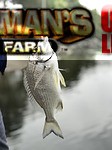

Most of our customers who buy live worms and crickets for bait, use those worms and crickets live on the end of their fishing hooks. Many also use preserved bait that was once alive as part of their bait repertoire.
What does a fisherman do with all of those extra giant mealworms, redworms, European Night Crawlers, African Nightcrawlers, Crickets and Waxworms at the end of the season? Many let them die, or throw them away, and some will try to breed them. Why not preserve them so that you will have bait well into the future? The cost savings, in the long run, could well be worth the upfront costs of the preservatives used in the process.
Think about the possibilities of being able to buy grubs, Bloodworms, leeches, meal worms, frogs, flies, pork, bees or anything that you might find in the wild for bait, and preserve them for future use with just a few ingredients that you can find right using the links below, or even from your local pharmacy.
I have found cases of small booklets in our office by Charlie Morgan, written in 1970, titled How To Preserve Bait of All Kinds. We purchased cases of this booklet a while back and we are offering them at cost to you. Shipping is included in the price. You can see that the booklet is going for $10 and $25 on Ebay and Amazon, but we bought these in bulk about 15 years ago and we are offering them to you for $5.95 with free shipping via US mail. The booklets are 24 pages long so they are easy to read and follow.
It is a bit dated and does not mention how to dispose of the ingredients used to preserve bait. I will caution you that you should only preserve bait if you are planning on selling preserved bait, have a means to dispose of the ingredients and have adequate latex gloves, goggles and other protective clothing and ventilation.
The booklet has a great deal of information on exactly how to preserve bait and even some tips on caring for and growing some of organisms used for bait. It also touches upon packaging and selling the bait. Heck, the booklet even explains how to preserve pork rinds.
If you are looking to preserve a great deal of bait, or want to start a small bait business, this booklet can get you well on your way. It also just makes for an interesting read for anyone who might be interested in how it is done.
There are really 3 ingredients that Charlie Morgan mentions and I have placed links to where you can find those ingredients below. They are still readily available.
Get Your Booklet Now While Supplies Last.
- Formaldehyde
[phpbay keywords=”formaldehyde” num=”3″ siteid=”1″ sortorder=”BestMatch” templatename=”columns” columns=”3″ paging=”true”]
2. Sodium Benzoate
[phpbay keywords=”sodium benzoate” num=”3″ siteid=”1″ sortorder=”BestMatch” templatename=”columns” columns=”3″ paging=”true”]
3. Anise Oil
[phpbay keywords=”anise oil” num=”3″ siteid=”1″ sortorder=”BestMatch” templatename=”columns” columns=”3″ paging=”true”]


